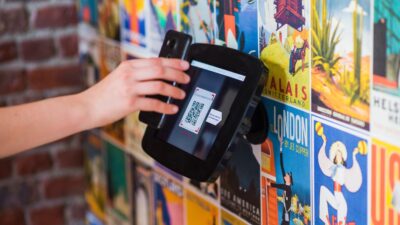Deborah Bunker and Christian Ehnis

Repertoires of collaboration to create situational awareness during the COVID-19 crisis
We are currently witnessing a complex interaction between our health, social, economic and political systems which is being impacted by our current lack of confidence in our COVID-19 situational awareness. For instance, uncertain situational awareness during this pandemic is having a profound effect on everything from the performance of the financial markets to our social interactions with others. We introduce the concept of repertoires of collaboration to tackle the infodemic unfolding on social media and to create situational awareness.
The key insight
If the COVID-19 pandemic has taught us anything it’s that early, co-ordinated, consistent and clear information and communications from trustworthy sources are of vital importance for the support of disease containment strategies.
Because in the early stages of contagion, official and trustworthy information about the seriousness and virulence of the disease was scant, a window of opportunity opened for the virus to spread. And with it, the spread of misinformation occurred across traditional and social media, driving some commentators to highlight an “infodemic”. This infodemic amplified the scale of the epidemic, putting health and economic systems under unsustainable pressure.
In order for all of us in our various societal roles to develop a sense and understanding of shared direction and meaning in a crisis, and to know “what do I need to do to keep people safe”, the inevitable early information vacuum must be filled with simple, accurate and reliable information as quickly as possible. While the WHO has been working with social media companies to debunk myths and rumours about COVID-19 as quickly as possible, this game of catch-up is not scalable or sustainable in the long term.
Governments around the world must work with their citizens to develop effective, collaborative and meaningful communications frameworks and systems to ensure that trustworthy information reaches those who need it quickly, in order to minimise adverse consequences. “Almost everyone” asking “what should I do to keep everyone safe”, means that our current communications strategies will inevitably lead to systems failure.
COVID-19 has produced a pandemic scenario which is placing great stress on our communication and information systems. Under stress, these systems degrade and sometimes fail in their ability to provide, exchange, and make use of accurate information to produce “situational awareness”. Adequate situational awareness should reflect a common picture of a situation that supports our critical decision making in our global, national and local communities. If we have incomplete, poor or inaccurate situational awareness then we make sub-optimal decisions which might set off other cascading crises or disasters.
When official communications systems degrade or fail there is an “information gap” which individuals move to fill using their own social networks and communications systems i.e. using social media. The problem with social media is that it can provide an overload of conflicting and often inaccurate information which can be both unintentionally and intentionally propagated by individuals and groups. The WHO refers to this problem in the context of COVID-19 as a social media ‘Infodemic’ that is “an over-abundance of information – some accurate and some not – that makes it hard for people to find trustworthy sources and reliable guidance when they need it.” This information overload can also spur individuals and groups to take inappropriate or dangerous action that may have serious consequences such as the rumour that drinking bleach would kill the COVID-19 virus.
If we are to develop trustworthy, accurate and effective situational awareness for COVID-19 (or indeed for any crisis or disaster), enhancement of systems control for communications and information sharing is a priority. This is what we term Repertoires of Collaboration (Bunker et al., 2015, Ehnis & Bunker, 2020) which requires the following key activities to take place in a coordinated approach at a global, national and local level:
- Involvement of all key systems stakeholders such as governments, their agencies, health workers, communities and individuals to define communications and information sharing arrangements, so as to highlight both their diverse needs as well as the direct benefits of involvement in collaboration;
- Reflection of an ability to deal with uncertainty and complexity through the articulation of coordination and control mechanisms such as communications and information policies and programs;
- Dealing with economies of scale from small to very large responses for the efficient procurement and allocation of emergency management resources among stakeholders;
- Development of a sense of shared direction by having all key systems stakeholders identify with and contribute to the picture of situational awareness as well as the meaning making and critical decisions a sense of shared direction supports;
- Outlining of an orderly process for adapting to change by building communications and information learning capabilities and the skills of critical stakeholders to assist them to cope with fluid and dynamic crisis situations and the changing communications and information requirements that accompany these changes.
For instance, in order to counter the effects of an overload of inaccurate and misinformation on social media, the WHO collaborates with the providers of social media platforms such as Facebook and WhatsApp to refute false information and propagate accurate communications to the general public. This reflects the WHO’s overall commitment to the development of a shared direction, meaning making and critical decisions around the COVID-19 pandemic for communications and information provision. The scale of this type of effort is possible where there is a global focus of resources on a disease and it was effective during the early outbreak of COVID-19 in China. It is problematic, however, for dealing with the overload of inaccurate and misinformation on a local level from the subsequent multiple outbreaks in many countries around the globe. We are now seeing that resources and attention are becoming diverted to dealing with the specific characteristics of the outbreak within each country which reflects a lack of scalability to a local level of this initial strategy by the WHO.
We know that rumours and information overload are nothing new and that they are rampant on social media platforms; however, a social media facilitated ‘Infodemic’ on this scale is a novel phenomenon which is currently not fully understood. It is important, for all our sakes, that effective and resource efficient communications strategies, frameworks, approaches and policies and procedures for ‘Infodemic’ mitigation, be developed by key stakeholders or we will continue to witness the adverse consequences of inaccurate and poor situational awareness. During a crisis such as this pandemic, it is important to work as a global community to ensure that trustworthy information reaches those who need it as quickly as possible so that they can develop their situational awareness for effective decision making. This cannot be achieved without a focus on the development of key elements of communications and information systems control and through enhancement of the learning capabilities and skills of all critical stakeholders.
This is part of a series of insights related to Coronavirus (COVID-19) and its impact on business.
Footnotes
Bunker, D., Levine, L., Woody, C. (2015). Repertoires of collaboration for common operating pictures of disasters and extreme events. Information Systems Frontiers, 17(1), 51-65. https://doi.org/10.1007/s10796-014-9515-4
Ehnis, C., Bunker, D. (2020). Repertoires of collaboration: incorporation of social media help requests into the common operating picture. Behaviour and Information Technology, 39(3), 343-359. https://doi.org/10.1080/0144929X.2019.1621934
Professor Deborah Bunker is a leading international scholar in organizational collaboration and change management in complex organisational and environmental settings at the University of Sydney Business School.
Christian is an Associate at McKinsey & Company. He is interested in how technology shapes and impacts organisations and society.
Share
We believe in open and honest access to knowledge.
We use a Creative Commons Attribution NoDerivatives licence for our articles and podcasts, so you can republish them for free, online or in print.






